

School and College Transport Homepage. Welcome to the School Services Transport Webpage We are the team who assess the eligibility of students for Home to School/College Transport.
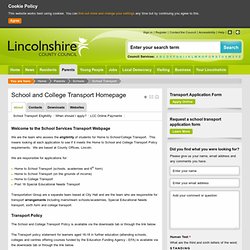
This means looking at each application to see if it meets the Home to School and College Transport Policy requirements. We are based at County Offices, Lincoln. Jolly Phonics - a child-centred approach to teaching literacy Jolly Learning. What is Jolly Phonics?
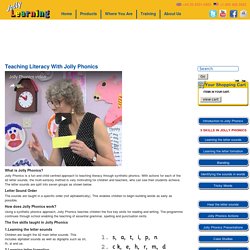
Jolly Phonics is a fun and child centred approach to teaching literacy through synthetic phonics. With actions for each of the 42 letter sounds, the multi-sensory method is very motivating for children and teachers, who can see their students achieve. The letter sounds are split into seven groups as shown below. Letter Sound Order The sounds are taught in a specific order (not alphabetically). How does Jolly Phonics work? Using a synthetic phonics approach, Jolly Phonics teaches children the five key skills for reading and writing. The five skills taught in Jolly Phonics 1.Learning the letter sounds Children are taught the 42 main letter sounds. 2.Learning letter formation Using different multi-sensory methods, children learn how to form and write the letters.
York Assessment of Reading for Comprehension. Kay Pictures - Vision testing for children. The World's Leading Augmented Reality Platform. Elklan Training Ltd - the speech and language trainers. Welcome to Investors in People. Artsmark. Activemark / Sportsmark - Charnwood Borough Council. The Literacy Shed - The Literacy Shed Home. The Mathematics Shed - Mathematics Shed Home. Sensory toys, games and activities, resources for children and adults and their special needs. Speechmark.
This hugely popular photocopiable manual provides professionals with a framework for the development of social skills.
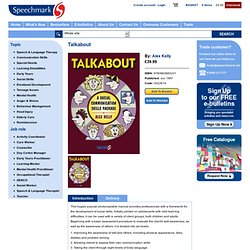
Initially piloted on adolescents with mild learning difficulties, it can be used with a variety of client groups, both children and adults. Beginning with a basic assessment procedure to evaluate the client's self-awareness, as well as the awareness of others, it is divided into six levels: 1. Improving the awareness of self and others, including physical appearance, likes, dislikes and problem solving 2. Allowing clients to assess their own communication skills 3. Age: 7+ Contents 161pp, A4, illustrated, wire-o-bound Chapters. Wendy Rinaldi Books for Professionals in Special Education. Welcome!
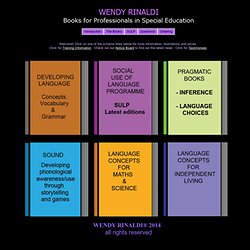
Click on one of the scheme titles below for more information, illustrations and prices. Click for Training Information Check out our Notice Board to find out the latest news Click for Testimonials. United Kingdom) - iPad. Information from the creator of Colourful Semantics – Alison Bryan. Information from the creator of Colourful Semantics – Alison Bryan I qualified as a Speech & Language Therapist in 1984 after studying at Manchester University.
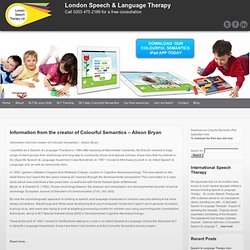
My first job covered a huge range of client groups from adult acute and long stay to community clinics and special schools. It was here that my interest in SLI [Specific Speech & Language Impairment ] was first stirred. In 1987 I moved to Mid Essex to work in an Infant Speech & Language unit, as well as community clinic. Rights Respecting Schools. The Rights Respecting Schools Award (RRSA) recognises achievement in putting the United Nations Convention on the Rights of the Child (CRC) at the heart of a school’s planning, policies, practice and ethos.
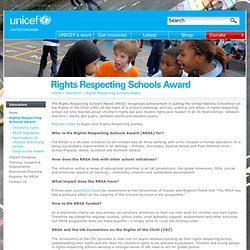
Sharing autism practice among local schools. The Autism Inclusion Mark for Lincolnshire (AIM4Lincs) is designed to respond to increasing demand, from staff across all educational settings, for advice and information on how best to support children and young people with autism.
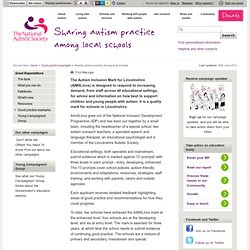
It is a quality mark for schools in Lincolnshire. Aim4Lincs grew out of the National Inclusion Development Programme (IDP) and has been put together by a small team, including the headteacher of a special school, two autism outreach teachers, a specialist speech and language therapist, an educational psychologist and a member of the Lincolnshire Autistic Society. Educational settings, both specialist and mainstream, submit evidence which is marked against 13 'prompts' with three levels in each prompt - entry, developing, enhanced. Quality Mark - Welcome to the Quality Mark.
Aiming for Outstanding in Parent Partnership « Leading Parent Partnership Award. EarlyBird Plus. EarlyBird Plus is for parents whose child has received a later diagnosis of an autism spectrum disorder (ASD) and is aged 4-8 and in Early Years or Key Stage One provision.
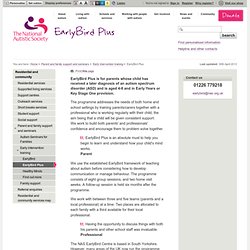
The programme addresses the needs of both home and school settings by training parents/carers together with a professional who is working regularly with their child, the aim being that a child will be given consistent support. We work to build both parents' and professionals' confidence and encourage them to problem solve together. EarlyBird Plus is an absolute must to help you begin to learn and understand how your child's mind works.Parent We use the established EarlyBird framework of teaching about autism before considering how to develop communication or manage behaviour.
The programme consists of eight group sessions, and two home visit weeks. EarlyBird Healthy Minds programme. The EarlyBird Healthy Minds programme is a six-session parent support programme to help promote good mental health in children with autism (including Asperger syndrome).
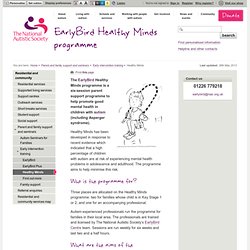
Healthy Minds has been developed in response to recent evidence which indicated that a high percentage of children with autism are at risk of experiencing mental health problems in adolescence and adulthood. The programme aims to help minimise this risk. Sensory Processing Disorder Explained. Sensory processing (sometimes called "sensory integration" or SI) is a term that refers to the way the nervous system receives messages from the senses and turns them into appropriate motor and behavioral responses.
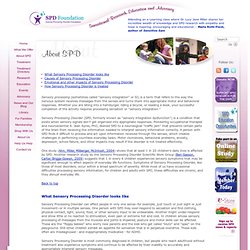
Whether you are biting into a hamburger, riding a bicycle, or reading a book, your successful completion of the activity requires processing sensation or "sensory integration. " Sensory Processing Disorder (SPD, formerly known as "sensory integration dysfunction") is a condition that exists when sensory signals don't get organized into appropriate responses. Pioneering occupational therapist and neuroscientist A. Jean Ayres, PhD, likened SPD to a neurological "traffic jam" that prevents certain parts of the brain from receiving the information needed to interpret sensory information correctly. A person with SPD finds it difficult to process and act upon information received through the senses, which creates challenges in performing countless everyday tasks. EarlyBird. EarlyBird is for parents whose child has received a diagnosis of an autism spectrum disorder (ASD) and is of pre-school age (not yet of statutory school age).
The programme aims to support parents in the period between diagnosis and school placement, empowering and helping them facilitate their child's social communication and appropriate behaviour in their natural environment. It also helps parents to establish good practice in handling their child at an early age, so as to pre-empt the development of inappropriate behaviours. Whilst there is no cure for autism, and no magic wand, EarlyBird is the closest thing you could wish for.Parent. Autism Accreditation. The National Autistic Society.